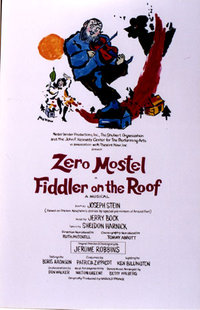Fiddler on the Roof
|
|
Fiddler on the Roof is one of the great stage and film musicals. It opened on Broadway in 1964 with music by Jerry Bock, lyrics by Sheldon Harnick, and libretto by Joseph Stein. Zero Mostel played the protagonist, Tevye the milkman, Maria Karnilova his wife Golde, Beatrice Arthur as Yente the Matchmaker, and Bert Convy as Perchik the student revolutionary.
Tevye was played by Chaim Topol in later productions; he also starred in the successful 1971 film adaptation by Norman Jewison.
The musical was revived on Broadway for the fourth time in 2004, with Alfred Molina as Tevye.
The story is based on Tevye and his Daughters, or Tevye the Milkman by the Russian Jewish author Sholom Aleichem , originally published in 1949.
| Contents |
Story
The play is set in the Jewish shtetl of Anatevka in Tsarist Russia in 1905. The story centers on Tevye's attempts to maintain family and religious traditions while adapting to new pressures. These manifest themselves chiefly in the strong-willed actions of Tevye's eldest three daughters, who each select her own husband (directly or indirectly), contrary to tradition. In the film, Tevye has five daughters.
Tevye himself had an arranged marriage with Golda, and had never even met before their wedding day. One touching song between them makes them realise that they really had grown to love each other.
Their eldest daughter, Tzeitel, was betrothed to a wealthy butcher older than Tevye (who said that he always wanted a son, but preferred one younger than him), but married the poor tailor Motel.
The second, Hodel, falls in love with a bright young revolutionary who is sent to Siberia, so she joins him.
The third, Chava, elopes to marry a Russian soldier, and Tevye disowns her.
Eventually, a pogrom takes place and all the Jewish families are forced to leave Anatevka to find new homes in other countries. As Chava prepares to part from the family, Tevye still wouldn't speak to her, but Tzeitel shouts out moving well wishes. Then Tevye relents and tells Tzeitel to say "God be with you".
The play's name stems from Tevye's habit of playing his violin on the roof of his house often at night to seek solace from the pressures of family life and the society around him. But in the 1971 film adaptation, the fiddler is not Tevye but an allegorical character, and the music is played by Isaac Stern.
Songs
The best-known songs from the tuneful but unconventional score are "If I Were A Rich Man", "Sunrise, Sunset" and "Matchmaker, Matchmaker Make Me A Match". In 1993, British reggae duo, Louchie Lou And Michie One released a reggae adaptation of "If I Were A Rich Man" entitled "Rich Girl", which became a dancehall hit in America and was popular across Europe. In late 2004, Gwen Stefani released a hit song called "Rich Girl" which was based on Louchie Lou And Michie One's earlier single.
Awards
The Broadway production won nine Tony Awards:
- Best Musical
- Composer and lyricist: Jerry Bock and Sheldon Harnick
- Leading actor: Zero Mostel
- Featured actress: Maria Karnilova
- Author: Joseph Stein
- Producer: Harold Prince
- Director: Jerome Robbins
- Choreographer: Jerome Robbins
- Costume designer: Patricia Zipprodt
The film won three Academy Awards, including one for arranger-conductor John Williams.
External links
- Playbill article about the original Broadway production (http://www.playbill.com/news/article/84588.html)
- Internet Movie database entry on the film version (http://www.imdb.com/title/tt0067093/)

